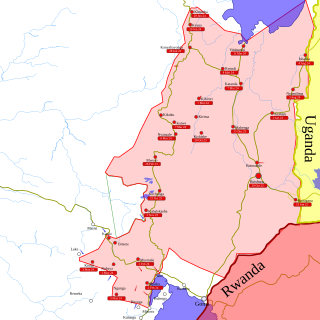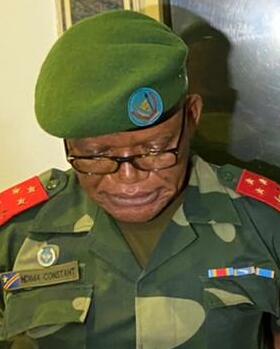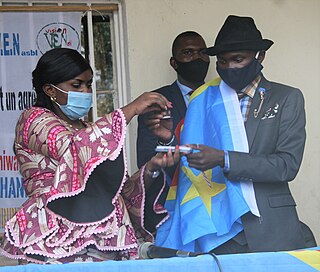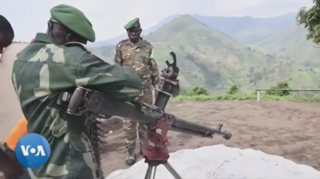
The Kivu conflict is an umbrella term for a series of protracted armed conflicts in the North Kivu and South Kivu provinces in the eastern Democratic Republic of the Congo which have occurred since the end of the Second Congo War. Including neighboring Ituri province, there are more than 120 different armed groups active in the eastern Democratic Republic of Congo. Currently, some of the most active rebel groups include the Allied Democratic Forces, the Cooperative for the Development of the Congo, the March 23 Movement, and many local Mai Mai militias. In addition to rebel groups and the governmental FARDC troops, a number of national and international organizations have intervened militarily in the conflict, including the United Nations force known as MONUSCO, and an East African Community regional force.
The Democratic Republic of the Congo (DRC) ratified the 2000 UN TIP Protocol in October 2005.
Kanyabayonga is a town straddling the Lubero and Rutshuru territories of North Kivu province in eastern Democratic Republic of the Congo (DRC). Administratively, the part which is in Lubero is the commune of Kanyabayonga and, the part in Rutshuru belongs to the Kanyabayonga groupement (grouping) which extends well south of the town and is within the Bwito chiefdom. The region as a whole has seen much armed conflict since 1993.

The March 23 Movement, often abbreviated as M23 and also known as the Congolese Revolutionary Army, is a Congolese rebel military group. Based in eastern areas of the Democratic Republic of the Congo (DRC), it operates mainly in the province of North Kivu, which borders both Uganda and Rwanda. The M23 rebellion of 2012 to 2013 against the DRC government led to the displacement of large numbers of people. On 20 November 2012, M23 took control of Goma, a provincial capital with a population of a million people, but it was requested to evacuate it by the International Conference on the Great Lakes Region because the DRC government had finally agreed to negotiate. In late 2012, Congolese troops, along with UN troops, retook control of Goma, and M23 announced a ceasefire and said that it wanted to resume peace talks.

Bunyakiri is a town located in the high plateau of Kalehe Territory in the South Kivu Province in the eastern region of the Democratic Republic of the Congo (DRC). Bunyakiri is nearby the Bulehe and Mulamba villages. It is mainly inhabited by Tembo, Havu, Twa and Hunde ethnic groups.

General Sultani Makenga is the military chief of the March 23 Movement, a revolutionary group based in eastern areas of the Democratic Republic of the Congo. Makenga is an ethnic Tutsi and was raised in North Kivu. He fought for the Rwandan Patriotic Front during the Rwandan Civil War.

The United Nations Force Intervention Brigade (FIB) is a military formation which constitutes part of the United Nations Organization Stabilization Mission in the Democratic Republic of the Congo (MONUSCO). It was authorized by the United Nations Security Council on 28 March 2013 through Resolution 2098. Although it is not the first instance in which the use of force was authorized by the UN, the Force Intervention Brigade is the first UN peacekeeping operation specifically tasked to carry out targeted offensive operations to "neutralize and disarm" groups considered a threat to state authority and civilian security. In this case, the main target was the M23 militia group, as well as other Congolese and foreign rebel groups. While such operations do not require the support of the Armed Forces of the Democratic Republic of the Congo (FARDC), the Force Intervention Brigade often acts in unison with the FARDC to disarm rebel groups.
The Land Forces, also called the Congolese Army, are the land warfare component and the largest branch of the Armed Forces of the Democratic Republic of the Congo (FARDC).

In late March 2022, the March 23 Movement (M23), supported by Rwanda, launched an offensive in North Kivu against the Armed Forces of the Democratic Republic of the Congo (FARDC) and MONUSCO. The fighting displaced hundreds of thousands of civilians and caused renewed tensions between the Democratic Republic of the Congo and Rwanda.

Beginning in 2022, tensions heightened between the Democratic Republic of the Congo (DRC) and Rwanda, marking a significant breakdown in relations between the two countries. Amid this, Rwandan forces have crossed into the DRC multiple times, usually fighting alongside Congolese rebels.

Constant Ndima Kongba is a Congolese military officer who served as the military governor of North Kivu from May 2021 to September 2023. Before this appointment, he had served in high-ranking positions in the Armed Forces of the Democratic Republic of the Congo (FARDC). In the Second Congo War (1998–2003), Ndima was a commander in the Movement for the Liberation of the Congo; in this role, he was involved in Operation Effacer le tableau, a campaign that resulted in genocidal massacres.
Yusufu Eric Mboneza, more commonly called Yusuf Mboneza, is or was a Congolese military officer and rebel. During his career he served in the Rally for Congolese Democracy, the National Congress for the Defence of the People, the Armed Forces of the Democratic Republic of the Congo, and finally the March 23 Movement.

The Rubaya mines, also known as the Bibatama Mining Concession, is a series of coltan mining sites near the town of Rubaya in Masisi Territory, North Kivu, Democratic Republic of the Congo. Officially, the mining license is held by Société Minière de Bisunzu Sarl (SMB), associated with Congolese senator Édouard Mwangachuchu. Specific sites include Bibatama D2, Luwowo, Gakombe D4, Koyi, Mataba D2, Bundjali, and Bibatama D3.
The Kishishe massacre occurred from November 29 to December 1, 2022, in the North Kivu village of Kishishe in the Rutshuru Territory in the eastern Democratic Republic of the Congo. The March 23 Movement, a predominantly Tutsi armed group, summarily killed at least 131 civilians in Kishishe following clashes with local militias, according to a preliminary United Nations investigation. At the same time, the Kinshasa authorities had previously reported approximately 300 fatalities. The attack also resulted in the displacement of hundreds of thousands of people who were forced to flee to other locations such as Kanyabayonga, Kibirizi, Kashala, Kirima, Nyanzale, Kashalira, Bambu, and Kitchanga. Some victims also sought refuge in neighboring countries due to the ongoing violence and instability in the region.

Kitchanga, also known as Kitshanga, is a town and a camp for Congolese Internally Displaced People (IDPs) strategically positioned between Masisi and Rutshuru territories of the North Kivu Province, with a vantage point overlooking Lake Kivu in the eastern region of the Democratic Republic of the Congo (DRC). Administratively, the Masisi part of Kitchanga functions as a larger urban center and the capital of the Bashali Chiefdom, while the other part is situated in the Bwito Chiefdom of the Rutshuru Territory. Geographically, Kitchanga is located approximately 90 km northwest of Goma and 10 kilometers north of Burungu, in close proximity to the villages of Kizimba and Budey. As of 2015, the population of Kitchanga was estimated at 18,927 for the Masisi Territory part and 25,157 for the Rutshuru Territory, excluding the populace within the displaced sites of Kahe and Mungote adjacent to Kitchanga in the Masisi Territory.

The Bwito Chiefdom is a chiefdom located in the Rutshuru Territory of North Kivu Province in the Democratic Republic of the Congo (DRC). It is bordered to the north by Batangi Chiefdom and Kanyabayonga commune in Lubero Territory, Bwisha Chiefdom in the east, and to the north-east by Lake Edward and the Republic of Uganda. To the west, it is bordered by Bashali Chiefdom in Masisi Territory, and to the northwest by Wanyanga Chiefdom in Walikale Territory. To the south, it is bordered by Nyiragongo Territory.
Events of the year 2024 in the Democratic Republic of the Congo.

Between January 24 and 26, 2023, M23 rebels and Armed Forces of the Democratic Republic of the Congo (FARDC) soldiers fought over the city of Kitshanga. The battle was part of the renewed M23 offensive, and ended on January 26 with M23 forces capturing the city. Civilians accused both M23 and FARDC-aligned militias of war crimes during and after the battle.

The Second battle of Kitshanga broke out between Rwandan-backed M23 fighters and self-defense groups known as Wazalendo allied with the Congolese government. In January 2023, M23 rebels captured Kitshanga from the Congolese Army and allied forces in their renewed offensive in North Kivu. Wazalendo forces captured Kitshanga in early October 2023 as part of a counteroffensive, with the city switching hands between Wazalendo and the M23 after October 16, and a second M23 offensive on October 21 capturing the town.

The Bashali Chiefdom is a chiefdom located in the Masisi Territory of North Kivu Province in the eastern region of the Democratic Republic of the Congo (DRC). Topographically, it is bounded to the east by the Virunga National Park, to the north by the Bwito Chiefdom of Rutshuru Territory, to the northwest by Walikale Territory, to the south by the Bahunde Chiefdom, and to the west by the Osso sector. Encompassing a total area of 1,582 square kilometers, the chiefdom is the administrative and sociopolitical structure for the Hunde ethnic group and is administratively subdivided into two groupements: Bashali-Mokoto and Bashali-Kaembe. Kitchanga, the urban center and administrative capital of the Bashali-Mokoto groupement, is the most densely populated locality within the chiefdom.













